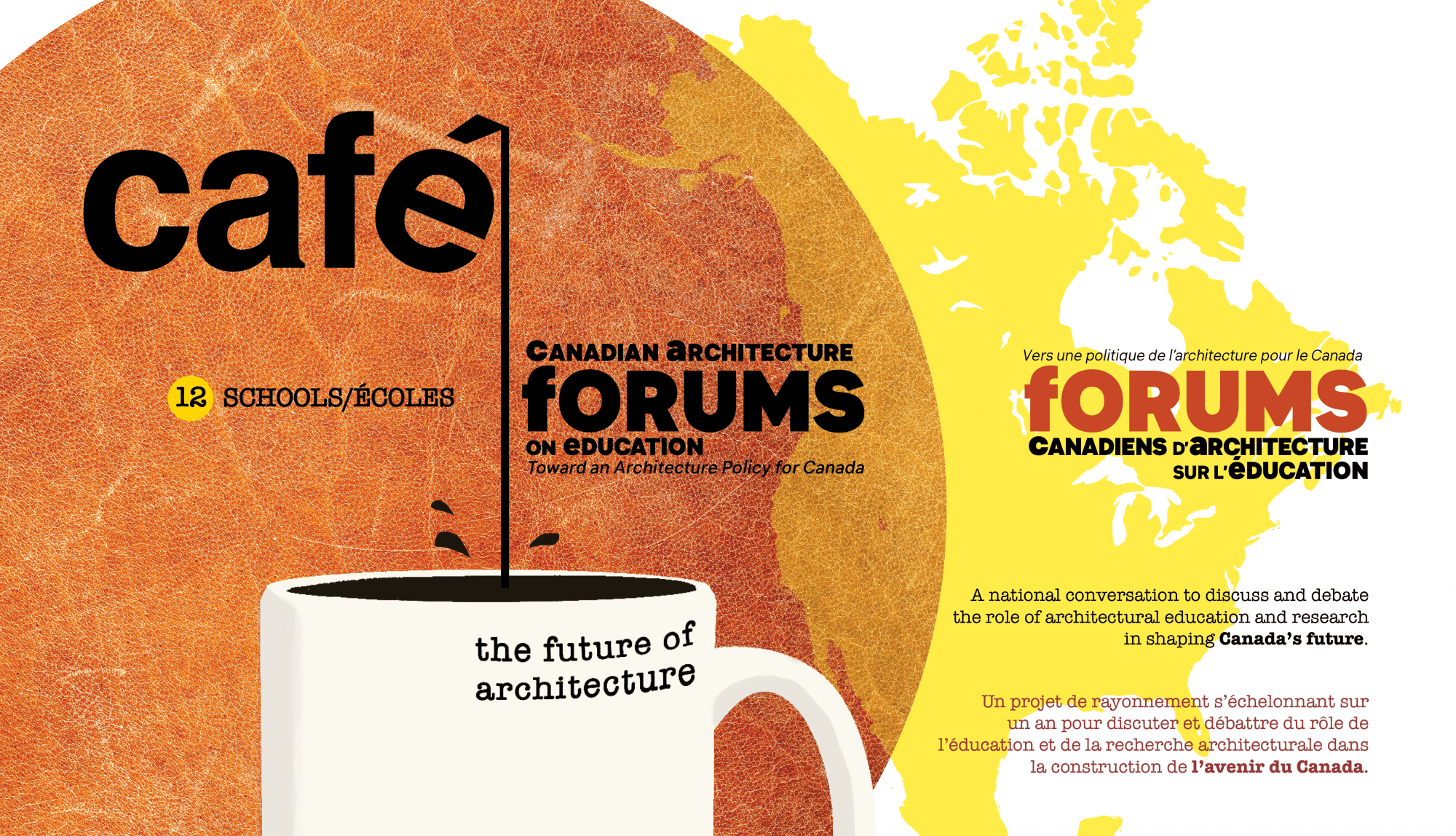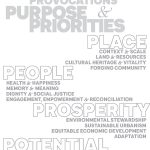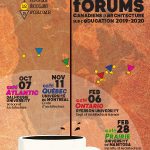The Canadian Architecture Forums on Education (CAFÉs) are part of an ongoing outreach project launched in 2019 to discuss and debate the role of architectural education and research in shaping Canada’s future. 2022 events include: CAFÉ Capital: Towards Equity in Architecture.
The initiative involves all 12 Canadian schools of architecture and their extended communities.
Knowledge and ideas mobilized through these forums are informing the development of an architecture policy for Canada. The forums are enabling students, educators and academic researchers to play meaningful roles in shaping a policy framework, its priorities, ambition and depth of vision.
Between October 2019 and March 2020 five in-person forums were hosted at five universities across Canada. Key outcomes of these forums, an online survey, and student manifestos were published in the CAFÉ Summary Report (Sept. 2020).
A series of workshops and CAFÉ Capital event focused issues on social justice will take place in 2022.
CAFÉ is led by the Canadian Council of University Schools of Architecture (CCUSA), representing all CACB-accredited architecture programs in Canada, with the support of Connection Grants from the Social Sciences and Humanities Research Council of Canada (SSHRC). Further support is provided by participating university institutions and the Canadian Architecture Students Association (CASA).
The national policy initiative – to which these CAFÉs contribute – is jointly led by the Regulatory Organizations of Architecture in Canada (ROAC), the Royal Architectural Institute of Canada (RAIC), and CCUSA. To learn more about this national initiative, see Rise for Architecture.
WHAT IS AN ARCHITECTURE POLICY?
A national architecture policy is an aspirational document. Whereas a building code sets minimum standards, an architecture policy sets forth ambitious goals and calls to action with compelling arguments, images, quotes and case studies. It shows how well-designed settings can enhance social, cultural and environmental well-being, and provides guidance to politicians, professionals and the public on how to achieve more sustainable, equitable and engaging communities. An architecture policy empowers people to pursue positive change and sustainable growth. It would inform public debate, influence legislation and inspire Canadians to create more meaningful and resilient cities and rural development in view of climate change, rapid urbanization, vulnerable lands, threatened heritage and other 21st century challenges.
More than thirty countries have already adopted or are in the process of developing a national architecture policy. To learn more about architecture policies, see RESOURCES.
CAFÉ CAUSE – WHY THESE FORUMS MATTER
The Canadian Architecture Forums on Education are bringing vigour, rigour and long-term relevance to the process of creating an architecture policy for Canada. Meaningful involvement of the academic sector is crucial to ensuring that any future policy is informed by current research, robust with fresh ideas and relevant for future generations of architects.
Educators and students are key stakeholders in the future of architecture. University schools of architecture are where the next generations of designers are trained to envision, evaluate and tackle new and persistent challenges. Schools do more than prepare capable graduates; they are where future professionals become inspired to think in new and interconnected ways about the built, natural and social world. Through experimentation, collaboration and open-ended questioning, schools approach design more optimistically, imaginatively and interrogatively than many practitioners and policy makers can afford to do. Pedagogical projects balance real-world challenges with creative license, critical distance and historical perspective, and can have significant regional impact through community engagement. Architecture schools are uniquely positioned to support visionary, experimental and even controversial design research, and to discover new possibilities for the discipline by holistically rethinking how sustainable, just and inspiring environments might be conceived and collaboratively manifested.
By facilitating exchange between all Canadian architecture schools and regional partners, this CAFÉ initiative mobilizes knowledge, while building mutual understanding of how diverse pedagogies and research can impact communities, reimagine the role of architects and architecture, and enable students to thrive in a changing world.
Participating Schools
Dalhousie University, School of Architecture
Université Laval, École d’architecture
Université de Montréal, École d’architecture
McGill University, Peter Guo-hua Fu School of Architecture
Carleton University, Azrieli School of Architecture & Urbanism
Ryerson University, Department of Architectural Science
University of Toronto, John H. Daniels Faculty of Architecture, Landscape and Design
University of Waterloo, School of Architecture
Laurentian University, McEwen School of Architecture
University of Manitoba, Faculty of Architecture
University of Calgary, School of Architecture, Planning and Landscape
University of British Columbia, School of Architecture + Landscape Architecture
Collaborators
Project Team
Lisa Landrum, Project Lead, Associate Professor and Associate Dean (Research), Faculty of Architecture, University of Manitoba
Anne Bordeleau, CCUSA Chair (2016-2020), Associate Professor and O’Donovan Director, School of Architecture, University of Waterloo
Café Capital SSHRC co-applicants:
Piper Bernbaum, Anne Bordeleau, Natalia Escobar Castrillón, and Ozayr Saloojee, Carleton University
+ collaborating professors and directors of other participating university architecture programs
Student Assistants, University of Manitoba
Temitope Akinsiku, M.Arch student & President of UMAAS 2022-2023 (CAFÉ Capital)
Nichola Basford, ED-Architecture student & Undergraduate Research Award winner (website design and initial development), University of Manitoba
Alina Bilonozhko, ED-Architecture student & Undergraduate Research Award winner (CAFÉ Capital workshops)
Faith Campos, Anishinaabe/Dakota, ED4 Landscape + Urbanism student
Danielle Desjarlais, Cree, Peguis First Nation, AMP2 Student, Faculty of Architecture, University of Manitoba (CAFÉ Prairie, Indigenous Conversation)
Benita Kliewer and Rhys Wiebe, Undergraduate Research Award winners (2020 report support), University of Manitoba
Alixa Lacerna, M.Arch student (research support)
Andria Langi, M.Arch student (animations and research support)
Nicole Luke, Inuk, M.Arch student
Cole Marotta, ED-Architecture student & Undergraduate Research Award winner (CAFÉ Capital)
Reanna Merasty, Cree, Barren Lands First Nation, M.Arch student, Department of Architecture, University of Manitoba (CAFÉ Prairie, Indigenous Conversation)
Jessica Piper, M.Arch student & President of UMAAS 2019-2020 (University of Manitoba Association of Architecture Students)
Sabba Rezai, Undergraduate Research Award winner (website)
Mackenzie Skoczylas, Ojibwa, Shoal Lake No. 40 First Nation, M.Arch student
Tia Watson, M.Arch Student and CASA Representative
+ student representatives at all participating schools of architecture:
Celina Abba, School of Architecture, Dalhousie University (CAFÉ Atlantic coordination)
Guillaume Duteaud, École d’architecture, Université de Montréal (translation assistance)
Maude Tousignant-Bilodeau, École d’architecture, Université de Montréal (CAFÉ Québec coordination)
Stephanie Steriotis and the class of 2021 M.Arch students, Ryerson University (CAFÉ Ontario coordination).
Zach Ward and John Baziuk, M.Arch students, School of Architecture Planning and Landscape, University of Calgary




